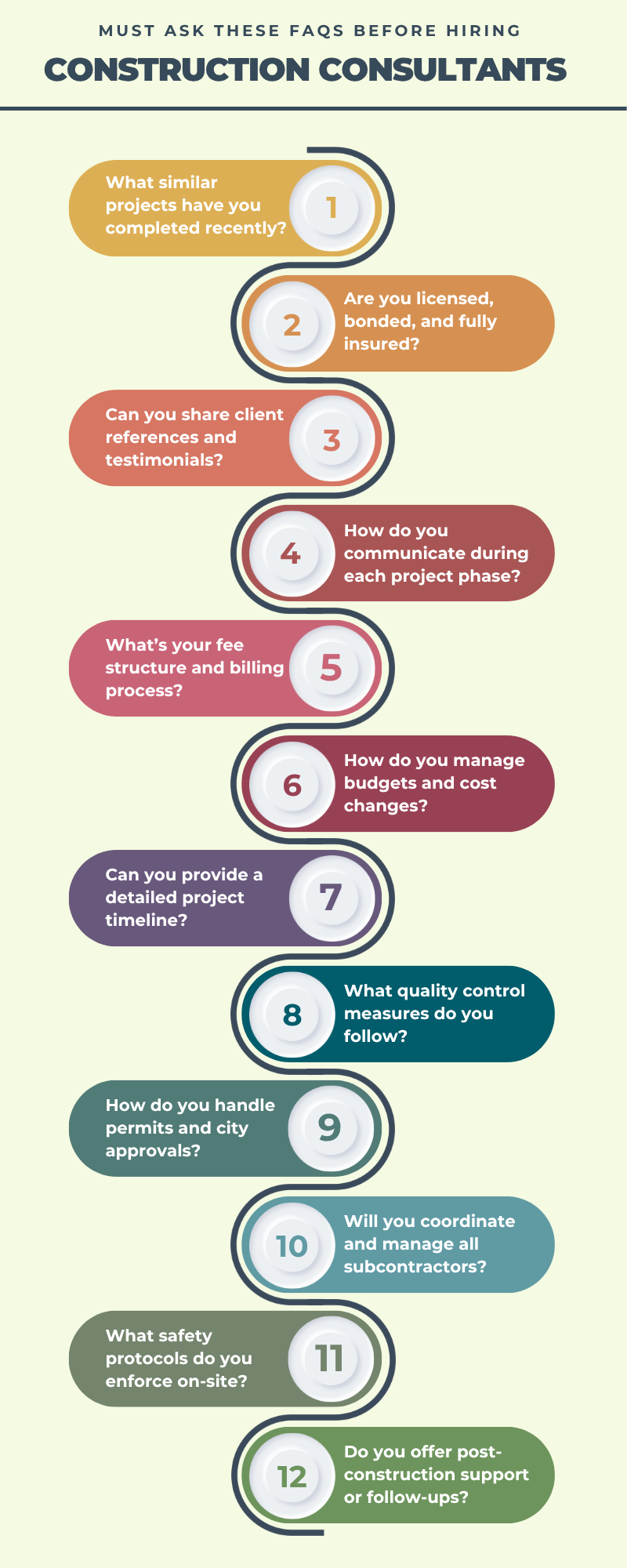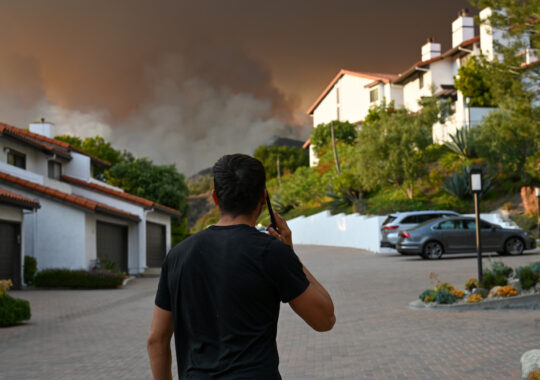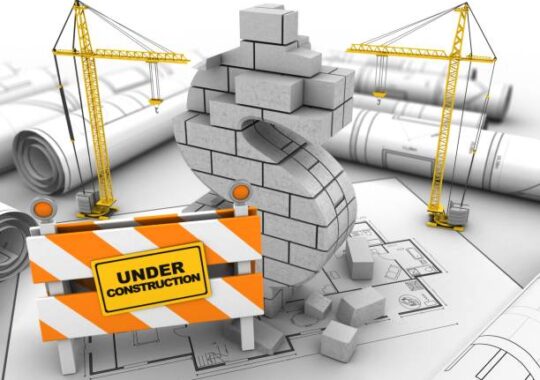10 Must‑Ask Questions Before Hiring Construction Consultants
Hiring the right construction consultants can make or break your project. Whether you’re building a multi-unit development or navigating city zoning codes, a trusted advisor can help you save time, avoid costly missteps, and keep things on track.
But how do you know who’s truly qualified?
Here are 10 essential questions you should ask before hiring a construction consultant—especially if you’re investing in a complex project in places like Los Angeles, where entitlement, permitting, and planning challenges can get tricky fast.
Let’s start now.

Table of Contents
Toggle1. What Relevant Experience Do You Have With Projects Like Mine?
Not all consultants are built the same. A consultant who specializes in commercial renovations may not be the right fit for a high-density residential build, a hillside subdivision, or a multi-phase mixed-use project.
Start by asking:
Have you worked on similar projects in scope, size, or location?
Do you have local permitting and entitlement experience?
Can you provide examples, not just a resume?
At JDJ Consulting Group, we’ve found that matching our experience to the client’s project type—especially for LA-specific zoning and CEQA matters—is one of the biggest indicators of success.
Here’s how to compare consultant experience quickly:
| Project Type | What to Look For in a Consultant |
|---|---|
| Small Lot Subdivision | Experience with parcel maps, density bonuses, SB 9, and Planning hearings |
| Commercial Renovation | Familiarity with ADA compliance, seismic upgrades, and tenant TI approvals |
| Multifamily Development | Knowledge of TOC incentives, CEQA exemptions, and ministerial approvals |
| Mixed-Use Urban Infill | Track record with conditional use permits, parking reductions, design review |
Tip: Don’t just look for industry buzzwords. Ask for real examples—case studies, photos, or city records.
2. Are You Properly Licensed, Bonded, and Insured for My Project Scope?
You’d be surprised how many people skip this step—until it’s too late.
A qualified construction consultant should always be:
Licensed to operate as a professional in your state or city
Bonded to give you financial protection if something goes wrong
Insured to cover liability for accidents or errors
Here’s why this matters: Without proper credentials, you may be legally or financially exposed if there’s a dispute, missed deadline, or failed inspection.
Here’s a quick overview of what to ask for:
| Credential | Why It Matters |
|---|---|
| Business License | Confirms the consultant can operate legally in your jurisdiction |
| Professional License | Required for certain services like civil engineering or architecture |
| General Liability Insurance | Covers property damage, consultant errors, or injuries |
| Bond Coverage | Protects you if the consultant fails to complete work or meet obligations |
Pro Tip: Ask for copies of these documents before signing anything. If they hesitate, that’s a red flag.
3. Can You Share References or Testimonials From Past Clients?
Referrals are your best filter. A polished website tells one story—but real feedback tells the truth.
You should ask for:
A list of past clients, ideally with similar project types
Contact details for one or two references
Any written testimonials, public reviews, or even Better Business Bureau ratings
At JDJ, we encourage potential clients to speak with our former clients. We also provide letters of recommendation from architects, developers, and attorneys we’ve worked with over the years.
When contacting a reference, consider asking:
What was the consultant’s communication style?
Did they hit key deadlines and budget targets?
How did they handle city planning or permitting issues?
If they hesitate to share references or only offer vague feedback, trust your gut—and consider looking elsewhere.
4. How Do You Manage Communication and Project Updates?
Smooth communication can be the difference between a minor delay and a six-month headache.
Ask upfront:
How will you keep me informed?
Who’s my day-to-day contact?
Do you use project management tools or rely on emails and calls?
Some consultants use advanced tools like Procore, Buildertrend, or even shared Google Sheets to keep everything visible and trackable. Others may prefer regular site meetings or weekly email updates.
Here’s a side-by-side of communication methods:
| Method | Best For | Watch Out For |
|---|---|---|
| Weekly Status Calls | Clear verbal updates and issue resolution | Can miss documentation |
| Email Reports | Trackable communication and timelines | May lack real-time updates |
| Shared Dashboards | Live budget, schedule, permit tracking | Requires tech access and training |
| In-Person Meetings | Best for walkthroughs or plan reviews | Hard to schedule if you’re remote |
Tip: Make sure they’re proactive. If you’re always chasing updates, you’ll lose valuable time.
5. What Is Your Fee Structure and How Do You Handle Budgets?
Cost surprises are the fastest way to sour a construction project.
Be clear about:
How they charge (hourly, flat-fee, percentage of project cost)
What’s included—and more importantly—what’s not
How they manage and track your budget through the phases
Ask for a sample cost breakdown from a previous job. A quality consultant will have transparent, itemized records—not just a lump-sum figure.
Common consultant pricing models:
| Fee Model | Description | When It’s Best Used |
|---|---|---|
| Flat Fee | Set price for defined scope of work | Small to mid-sized projects with clear scope |
| Hourly Rate | Billed by time spent | When tasks are undefined or vary widely |
| Percentage of Construction Cost | Based on final construction cost | For end-to-end services or larger builds |
| Cost Plus | Consultant passes through expenses plus markup | Requires tight oversight and trust |
Also ask: How are change orders billed? Will I approve extras before they’re charged?
6. Can You Outline a Realistic Timeline for My Project?
Every project has moving parts—permits, reviews, subcontractors, material lead times. Your consultant should be able to map out:
Pre-construction tasks (entitlements, permits, utility coordination)
Major milestones (design approval, plan check, construction start)
Contingency time for delays
Don’t settle for “about 6–8 months.” Ask for a milestone-based timeline that reflects your jurisdiction’s review timelines and your site conditions.
Here’s what a basic development timeline might look like:
| Phase | Average Duration | Milestone |
|---|---|---|
| Feasibility & Due Diligence | 2–4 weeks | Zoning check, site visits, preliminary plan |
| Entitlements & City Approvals | 2–6 months | Planning case filed, public hearings |
| Construction Documents | 1–2 months | Architect plans, consultant coordination |
| Permitting & Plan Check | 1–3 months | Building & safety approvals |
| Construction Start | — | Contractor mobilized |
Bonus Question to Ask: How do you build in buffers for city delays or weather setbacks?
7. What Quality Control Measures Do You Have in Place?
Good consultants don’t just plan—they inspect, verify, and hold teams accountable.
Ask:
How do you ensure construction quality on-site?
Do you conduct milestone inspections or third-party reviews?
Who signs off on completed phases?
Many construction management consultants offer internal checklists, compliance reviews, or schedule third-party inspections during framing, mechanicals, or finishes.
Here’s a sample comparison of quality control methods:
| Quality Assurance Tool | Purpose | Red Flag If Missing |
|---|---|---|
| Milestone Inspections | Checkpoints during key construction phases | Risk of missed defects or code violations |
| Subcontractor Vetting | Ensures only qualified trades are hired | Inconsistent workmanship |
| Punchlist Review | Final walkthrough before client handover | Post-move-in surprises |
| External Audits | 3rd-party structural, MEP, or ADA reviews | Poor transparency or non-compliance |
Pro Tip: Ask if they have experience aligning with LEED, CALGreen, or Title 24 standards if your project requires sustainability compliance.
8. How Do You Handle Permits, Building Codes, and Compliance Issues?
In cities like Los Angeles, navigating building regulations is half the battle.
A strong consultant should:
Know which approvals you need (Zoning Admin, LADBS, Planning, Public Works, etc.)
Coordinate paperwork with architects, civil engineers, and legal teams
Track deadlines and proactively flag code changes
You might ask:
Do you handle permit submittals or just advise?
Have you worked with LADBS or City Planning on similar projects?
What’s your strategy when a city reviewer issues corrections?
9. Will You Be Using Subcontractors or Specialists—and How Are They Managed?
Most consultants rely on outside specialists—land use attorneys, structural engineers, soil testers, etc. That’s not a problem, as long as they’re vetted and managed properly.
Here’s what to ask:
Who’s responsible for hiring and overseeing outside professionals?
Are they covered by insurance and properly licensed?
How will communication flow between your team and theirs?
At JDJ, we coordinate and lead all third-party teams—from surveyors to traffic consultants—under a unified project delivery plan. This keeps timelines tight and stakeholders aligned.
Watch for these signs of strong subcontractor coordination:
| Best Practice | Why It Matters |
|---|---|
| Master Consultant Schedule | Avoids delays from poorly-timed specialist input |
| Group Coordination Meetings | Keeps all trades updated and reduces misalignment |
| Shared File Systems (e.g., Dropbox, Procore) | Prevents document mix-ups and lost revisions |
| Lead Consultant Oversight | Ensures unified responsibility across all parties |
Bonus Tip: If a consultant says “that’s the architect’s job” too often—it’s a red flag. A true construction consultant owns the full process.
10. What Are Your Safety Standards and How Do You Protect the Job Site?
Safety isn’t just about compliance—it protects your workers, your timeline, and your budget.
Don’t hesitate to ask:
What safety protocols do you enforce during construction?
How do you handle on-site hazards or liability issues?
Do you have a safety manual or plan?
Strong consultants don’t wait for accidents. They create proactive safety plans, train teams, and ensure job sites stay clean, organized, and code-compliant.
Take a look at the safety practices you should expect:
| Safety Element | Why It Matters |
|---|---|
| Written Safety Plan | Provides consistent rules and emergency protocols |
| Weekly Safety Meetings | Reinforces awareness and reduces preventable incidents |
| Insurance Verification | Ensures subcontractors carry workers’ comp and liability |
| Site Security & Access Logs | Limits trespassing, theft, and unauthorized personnel |
Tip: Ask if they’ve had any OSHA violations in the past 5 years. A clean record says a lot.

Hiring a Construction Consultant?
Don’t sign that contract until you’ve asked these 12 essential questions! From experience and permits to safety and communication, these questions help you avoid costly mistakes and hire with confidence.
Bonus Questions That Separate Great Consultants From Good Ones
Before you sign any contract, consider asking a few more high-impact questions. These extras reveal how the consultant really operates behind the scenes.
How Many Projects Are You Managing Right Now?
A busy consultant isn’t always a bad sign—but if they’re juggling too much, your project may suffer. Ask about team size and bandwidth.
What Software or Tools Do You Use to Stay Organized?
Look for consultants who use tools like:
Procore
Bluebeam Revu
Smartsheet
Microsoft Project or Primavera
These systems keep tasks visible, files organized, and deadlines realistic.
Do You Offer Post-Construction Support?
Some consultants walk away once the final inspection is complete. Others stay with you through punch lists, warranty claims, and final occupancy.
Choose the one who sticks around.
Final Checklist: Questions and Documents to Review Before Hiring
To wrap up, here’s a practical summary to guide your next interview. Use this checklist to avoid missing key questions or documents during your selection process.
 Ask This Question Ask This Question |  Get This Document or Proof Get This Document or Proof |
|---|---|
| What relevant projects have you completed? | Project portfolio, photo documentation |
| Are you licensed, bonded, and insured? | Copies of license, insurance certificates, bond info |
| Who will manage day-to-day communication? | Org chart or point-of-contact confirmation |
| How do you handle budgeting and cost overruns? | Sample bid, fee structure, or past invoices |
| How do you manage permitting and city coordination? | Timeline with permit responsibilities |
| What safety procedures are in place for this site? | Sample safety plan or OSHA log |
| Who are your third-party partners or subcontractors? | Consultant directory or resume packet |
| Can I speak with past clients or architects? | References with phone numbers or email addresses |
Hiring construction consultants isn’t just about ticking boxes—it’s about finding someone you trust to guide your investment, protect your interests, and navigate the complexities of the built environment.
By asking these 10 questions (plus a few bonus ones), you can cut through the noise, compare firms clearly, and feel confident about who you’re hiring.
Whether you’re planning a small lot subdivision, a commercial adaptive reuse, or a multifamily development in the LA area, the right consultant will help you avoid costly mistakes and get it done faster—with fewer surprises along the way.
Let’s Build It Right—Together
At JDJ Consulting Group, we’ve helped developers, landowners, and architects across Southern California bring their vision to life—while staying compliant, on schedule, and on budget.
Our team is ready to answer every question you have before hiring a construction consultant.
Call us at +1 (818) 827-6243 or contact us online to schedule a free consultation. We’ll walk you through your project, answer your questions, and help you take the next step with confidence.
12 Questions to Ask Before Hiring a Construction Consultant
Here’s how JDJ Consulting Group answers the questions smart developers always ask. Don’t commit until you read this.
Yes—projects just like yours across Los Angeles and SoCal.
Fully. We’re bonded, insured, and compliant in California.
Of course—references and testimonials available on request.
Weekly updates, single point of contact, clear timelines.
Transparent, fixed-fee or milestone-based—tailored to scope.
We track every item and prevent surprises before they happen.
Yes—milestone schedules built around real agency timelines.
We lead QA, flag issues early, and enforce accountability.
Yes—from LADBS to Planning and Public Works coordination.
Related Posts

SB 9…

Top 10…

How Much…

Best Construction…
Leave a Reply
Cancel reply
Recent Posts
-
How to Prepare for Zoning Hearing in Los Angeles

-
How to Use Due Diligence in Real Estate Development to Save Time and Costs

-
From Empty Lot to Luxury Home: The 6 Steps of LA Development

-
Understanding Los Angeles Zoning Maps (2025 Guide)

-
Keep or Sell Land in Los Angeles? An Expert Take for Smart Investors


Top Reasons to Hire a Construction Consultant | JDJ Experts
July 17, 2025
[…] job is to ask the right questions […]